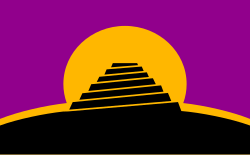Portal:Constructed languages
Introduction

A constructed language (shortened to conlang) is a language whose phonology, grammar, orthography, and vocabulary, instead of having developed naturally, are consciously devised for some purpose, which may include being devised for a work of fiction. A constructed language may also be referred to as an artificial, planned or invented language, or (in some cases) a fictional language. Planned languages (or engineered languages / engelangs) are languages that have been purposefully designed; they are the result of deliberate, controlling intervention and are thus of a form of language planning.
There are many possible reasons to create a constructed language, such as to ease human communication (see international auxiliary language and code); to give fiction or an associated constructed setting an added layer of realism; for experimentation in the fields of linguistics, cognitive science, and machine learning; for artistic creation; for fantasy role-playing games; and for language games. Some people may also make constructed languages as a hobby, or in connection to worldbuilding.
The expression planned language is sometimes used to indicate international auxiliary languages and other languages designed for actual use in human communication. Some prefer it to the adjective artificial, as this term may be perceived as pejorative. Outside Esperanto culture, the term language planning means the prescriptions given to a natural language to standardize it; in this regard, even a "natural language" may be artificial in some respects, meaning some of its words have been crafted by conscious decision. Prescriptive grammars, which date to ancient times for classical languages such as Latin and Sanskrit, are rule-based codifications of natural languages, such codifications being a middle ground between naïve natural selection and development of language and its explicit construction. The term glossopoeia is also used to mean language construction, particularly construction of artistic languages.
Conlang speakers are rare. For example, the Hungarian census of 2011 found 8,397 speakers of Esperanto, and the census of 2001 found 10 of Romanid, two each of Interlingua and Ido and one each of Idiom Neutral and Mundolinco. The Russian census of 2010 found that in Russia there were about 992 speakers of Esperanto (the 120th most common) and nine of the Esperantido Ido. (Full article...)
Selected language

The Valyrian languages are a fictional language family in the A Song of Ice and Fire series of fantasy novels by George R. R. Martin, and in their television adaptation Game of Thrones.
In the novels, High Valyrian and its descendant languages are often mentioned, but not developed beyond a few words. For the TV series, linguist David J. Peterson created the High Valyrian language, as well as the derivative languages Astapori and Meereenese Valyrian, based on the fragments given in the novels. Valyrian, alongside Dothraki, has been described as "the most convincing fictional tongues since Elvish".
In the world of A Song of Ice and Fire, High Valyrian occupies a cultural niche similar to that of Latin in medieval Europe. The novels describe it as no longer being used as a language of everyday communication, but rather as a language of learning and education among the nobility of Essos and Westeros, with much literature and song composed in Valyrian.
To create the Dothraki and Valyrian languages to be spoken in Game of Thrones, HBO selected the linguist David J. Peterson through a competition among conlangers. The producers gave Peterson a largely free hand in developing the languages, as, according to Peterson, George R. R. Martin himself was not very interested in the linguistic aspect of his works. The already published novels include only a few words of High Valyrian, including valar morghulis ("all men must die"), valar dohaeris ("all men must serve") and dracarys ("dragonfire"). Find out more...
Did you know...
...that J.R.R. Tolkien originally created his Middle-earth merely as a background for his constructed languages?
...that the earliest known constructed language, Lingua Ignota, was created by Hildegard of Bingen, who also acquired fame as a mystic, visionary, and composer of music?
...that Ill Bethisad is an alternate history project that features dozens of constructed languages?
Current events
(none)
Corresponding categories
Projects

|
You are invited to participate in WikiProject Constructed languages, a WikiProject dedicated to developing and improving articles about constructed languages. |
Things you can do
-
Join: Constructed Languages WikiProject & add {{Wikipedia:WikiProject Constructed languages/Userbox}}
Follow: Recent changes in related articles
Tag: {{WP conlangs}}, {{Constructed languages}}, and {{Infobox language}} (see WP:CL Templates)
Evaluate: Everything in Category:Unassessed constructed language articles
Report: Edit wars and deletions
Expand: everything in category:Constructed language stubs
Requests:
-
Abakwi, Ancient Language, Arovën, Baza, Bluddian, Dremlang, Eaiea, Eloi, Ekspreso, Esperando, Fasile, Glide, Herman Miller, Language Creation Society, Latejami, Mezhdunarodny Nauchny Yazyk, Mirad, Modern Indo-European, Mondlango, Musbrek, Noxilo, Or'zet, Romanica (rd), Romanova (rd), Signuno, Sperethiel, Szkev, Tceqli/Ceqli, Thosk, Tokcir, Troscann, Unas, UNI, Universalspråket, Vorlin.
Web resources

Some Internet resources relating to constructed languages, by Richard Kennaway
UniLang.org
Conlang wiki
Articles
Wikipedia in constructed languages
Associated Wikimedia
The following Wikimedia Foundation sister projects provide more on this subject:
-
Commons
Free media repository -
Wikibooks
Free textbooks and manuals -
Wikidata
Free knowledge base -
Wikinews
Free-content news -
Wikiquote
Collection of quotations -
Wikisource
Free-content library -
Wikiversity
Free learning tools -
Wiktionary
Dictionary and thesaurus














